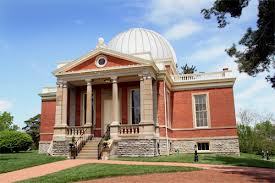In late October, 1843, John Quincy Adams, then 76 years old, traveled to Ohio, the only trip he ever took to the American interior. He had been invited to lay the cornerstone of an observatory to be built by the Astronomical Society of Cincinnati. Adams had been fascinated by astronomy from his days at Harvard, and as President he had called on the nation to build a network of observatories in order to advance scientific understanding.

The Cincinnati Observatory
At first Adams had worried that the long trip would be hard on his fragile health, but almost as soon as he boarded the train to Springfield he began to marvel at the speed and comfort of America’s emerging transportation network. In Adams’ youth, the trip from Boston to Washington, by sailing ship and by carriage over shattered roads, had taken at least a week. Now he took a train to Buffalo, a steamer across Lake Erie and then a canal boat down the Ohio Canal from Cleveland to Hebron in central Ohio—a trip of at least 600 miles. Each leg required a day or less.
Adams was delighted by the improvement in America’s infrastructure. He was even more taken aback by the change in his own fortunes: He was greeted everywhere with wild enthusiasm. Adams had been America’s least popular president. Not only did he utterly lack the common touch, he was a primordial member of a New England elite which seemed increasingly out of touch with a burgeoning frontier nation. Yet in Cleveland he was recognized at a barbershop, and soon a throng gathered at his hotel, clamoring to look upon his face and to shake his hand. In Akron, he gave a speech at Town Hall, and then greeted citizens. “Among the women,” he wrote in his diary, “a very pretty one, as I took her hand, kissed me on the cheek. I returned the salute on the lip, and kissed every women that followed, at which some made faces, but none refused.”
For many Americans, and above all those in the free states, Adams was no longer the failed president of fifteen years earlier. He was, rather, a moral hero—a man who had stood almost alone in Congress to champion the right of the people to petition for an end to slavery, and who had persevered in the face of fierce efforts by slave-state Congressman to censure, intimidate and discredit him
The cornerstone-laying took place November 9. A torrential rain began that morning, and continued all day. Nevertheless, a vast crowd formed on Sixth Street, where a banner had been raised: “John Quincy Adams, Defenders of The Rights of man.” Thousands followed the procession to the hilltop site—later re-named Mount Adams—where the former president laid the cornerstone atop copies of the Constitution and the Declaration of Independence, and gave a brief address.
The newspapers of Cincinnati wrote of little else. The abolitionist Weekly Herald observed sardonically that Adams was the very same man he had been five years earlier, “when he was named, but to be cursed, and when to vindicate his course, was almost equivalent to a loss of caste.” Now he was beset by “an obsequious crowd of flatterers.” A less sour appraisal came from the Daily Advocate and Advertiser of Pittsburgh, where Adams ended his tour, and where workers had decided as a gesture of regard to close their factories for the day. “Somewhat of the respect which was manifested was doubtless due and given to the ex-President,” the editors wrote, “but the heartiness with which it was given was owing to esteem and affection for the man—for his undaunted spirit—his strict integrity—perseverance in duty—and true republicanism. …He has met the sober second thought of the people and it has at length done him justice.”
Adams despised all forms of hero-worship, and in his journal he declared himself “disgusted” by the adulation. In fact, this battle-hardened old warrior felt deeply touched, and profoundly grateful. He told a crowd in Covington, Kentucky that he had found citizens “disposed to manifest towards me such feelings as I know not how to allude to without emotion. Such as through a long life it has been my lot to experience very little of–such as in their extent, I had not the most distant idea, expectation or belief that I deserved.”
What Adams said about his expectation was plainly true. He had not opposed what he called “the slave power” in Congress with the hope of winning over the American people. He had expected to be isolated and despised; he had almost welcomed his mistreatment as a proof of integrity. And yet, precisely because he had stood fast when others feared to join him, Adams had become an object of veneration. The American people had, at length, done him justice.
 spilejonzelover liked this
spilejonzelover liked this jqaspeaks posted this